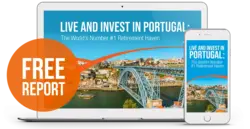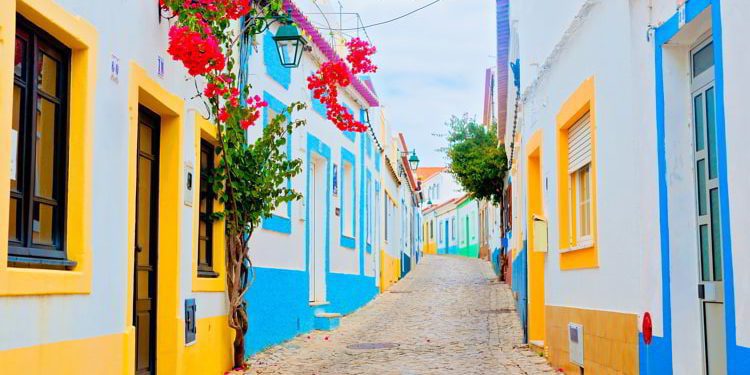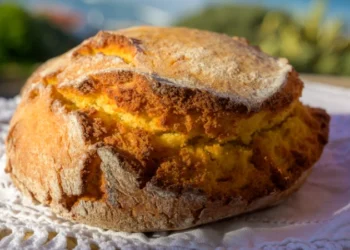I’m here in Carvoeiro, in Portugal’s Algarve region, for our annual Live and Invest in Portugal Conference, and it’s so good to be back…
Some observations after my hiatus…
The Food
The cuisine here is extraordinary… especially the seafood. Every menu has at least one entire page of fish options, whatever typically comes off the boats: sardines, mackerel, cod, octopus, shrimp, and on, and on… They grill it up and serve it whole. The simplicity is refreshing and the meals light yet filling—healthy feeling.
Coming from Paris, it shocks some folks to hear me rave about the food here… aren’t Parisian brasseries the height of gourmet? Sure, French food is rightly famous, but it isn’t inventive. It’s traditional and classic. The Portuguese aren’t afraid to experiment (with anything). My favorite innovation on this trip was a poached egg floating in tomato soup—the most richly delicious new combo I’ve had in a long time.
We spent the night in Setúbal, just to the south of Lisbon, on our way down to the Algarve. The boutique hotel and vineyard, Casa Palmela, on a historic property, served a meal that rivaled tasting menus in Paris that charge at least twice the price. The chef came out to greet us, offer us an aperitif, and when the plates arrived, he followed them to explain each ingredient in each dish—from which river the fish had been caught, from which region the lamb hailed, and which of the salads, vegetables, and garnishes came from the hotel’s own garden.
The Wind
It’s windy here. My husband loves it… my daughter thinks it’s a hilarious novelty… I hate it. Last I was here this time of year, it was much warmer and less windy, so I can attest that it’s not this blustery all the time, but there’s no denying this is a gusty country, north to south. I have a tendency to be cold, and when you factor in the wind chill, it’s a bit on the cooler side here for my taste right now.
We always talk about how sunny Portugal is, which is true, but sunshine doesn’t necessarily equal heat. It can get chilly despite the UV rays, especially in the north (where it is less sunny than here in the south). The climate here is mild year-round, but there are seasons, they’re just not harsh. It’s worth coming to experience Portugal’s “winter,” such as it is, so you know what to expect. One of our expat speakers said that she and her family loved Porto, but it was a bit too cold and gray for them, and also a bit too far north, meaning farther from things to visit.
Either way, don’t forget to pack your windbreaker when you come, whether as a tourist or a resident…
They say that Algarve gets 330 days of sunshine per year, in Lisbon it’s more like 250, and farther north in Porto, it drops a bit more. So no matter what time of year, you’ll need your sunglasses, too.
People Smoking
The rest of Europe seems to have embraced vaping… not so here in Portugal. I haven’t seen so many people smoking real cigarettes in what feels like a decade or more. If you’re a diehard smoker, this is a good place to come and feel in good company. On the other hand, I haven’t ever been bothered by the smoke—which I am sensitive to, as well for my daughter’s sake—so if you’re averse to smoking, I don’t think you’ll be upset by it. As everywhere, smoking is illegal indoors and smokers take their cigs outside. Thanks to the gusty weather, smoke is usually carried away quickly.
The Coastline
I had forgotten just how dramatic the coasts are… they truly take your breath away. Even in Lisbon, where the coastline is more river than ocean, you’re never far from water and the architecture that was built to greet ships coming in from the sea is as impressive now as it was 300 years ago.
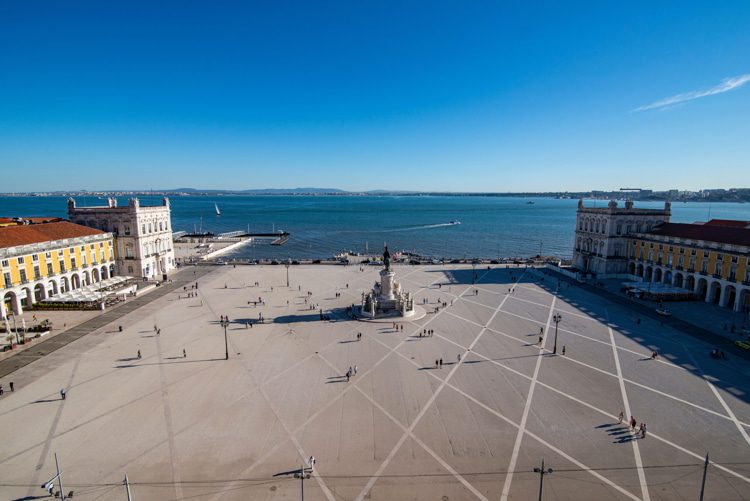
We stopped along the coast a few times as we headed south, and the shores never disappoint…
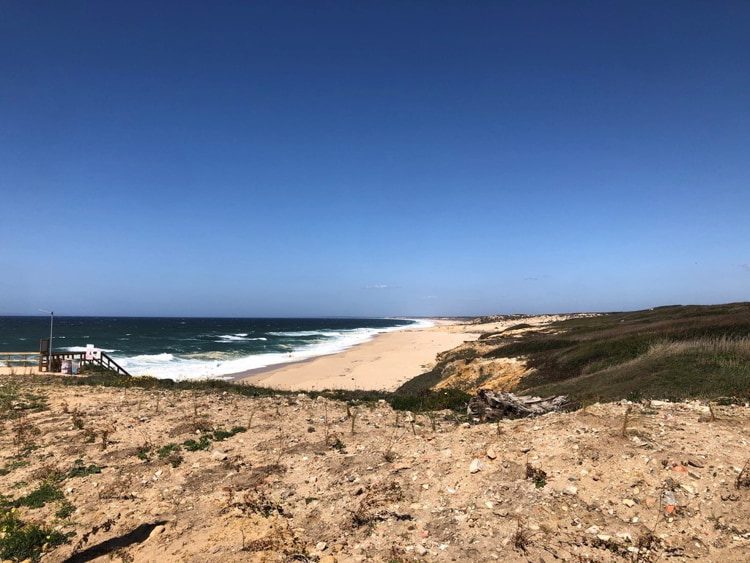
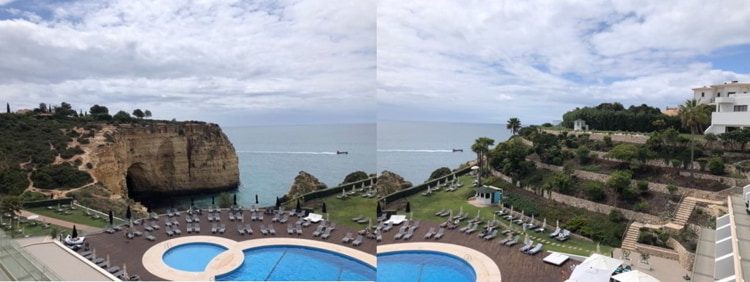
Get Your Free Portugal Report Today!
Simply enter your email address below and we'll send you our FREE REPORT — Portugal: The World’s #1 Retirement Haven...
Why Expats Move To Portugal
-Jeff and Joch Woodruff
Every expat we heard from at the conference is in it for citizenship, which is a testament to how straightforward the process is and how beneficial the second citizenship is. If you get naturalized, you’ll be tested in your Portuguese proficiency (the requirement is “basic knowledge,” not fluency) and one couple, Jeff and Joch Woodruff, was taking their test the day they presented.
Jeff and Joch are a bit unique in choosing to move to Braga, way up in the north, when most tend to head for the south. They love the architecture and history of their new home, but are toying with the idea of buying another place on the beach—Joch is more a city guy, Jeff more a beach guy. Their compromise of two houses, one to cater to each of their preferences, sounds like the perfect solution for a happy marriage to me!
-Allison Baxley
Another expat who presented, Allison Baxley, settled in Cascais, just outside of Lisbon, with her family, including school-aged children. Cascais has been named our #1 Retirement Haven in the past, and every reason she cited for moving there was one we identified when we named it a winner…
Cascais is close to Lisbon, but not a city; it’s got great international schools; it’s central in the country, making exploration easy; it’s not got the seasonal aspect of Algarve, where the population ebbs and flows with the tourist season; it’s not too hot, not too cold, with little climate variation throughout the year; it’s near the water and beach trips are quick and easy.
“To sum it up,” Allison says, “Cascais is a soft landing for expats. Lots of English is spoken here and there’s a big expat community. It’s diverse… in fact, it’s not the most authentically Portuguese place, which is a good and bad thing depending on what you’re looking for. It’s a great place to start off in Portugal, then maybe reassess as you settle in.”
Some other insights Allison had about life in general in Europe versus the States… “In Europe, you work less and live more. Life here is slow paced, and there’s so much to see and do. There’s such a different mentality of what life can be here—and we wanted it for ourselves and our kids.”
Her words got me thinking—this exciting adventure you’re on, expanding your horizons and learning about new cultures, it doesn’t have to be limited to yourself. No matter what age your kids or grandkids, or nieces and nephews, you can expose your family to it all as well as yourself. Have them come visit you and give them the gift of new, exotic experiences.
On this point, being a Latin country, Portugal loves kids… compared to Paris, it feels like we’re treated like royalty when we have a baby in tow. This is a great place for multigenerational vacations with kids and grandkids, as my family is proving on this trip. It seems like there’s no shortage of fun activities and sights for every age, including lots of water parks in the south. It’s a great excuse for the family back home to come visit you in your spectacular new home…
A Few Practical Tips I’ve Picked Up Sitting In The Conference Room:
-Bordr.io
Bordr.io offers services to help you get your Portuguese tax ID number, the NIF (needed for just about everything you do here), and a local bank account. You can pay a lawyer to do this for you, but it’s much cheaper to use this service, which is expanding into Golden Visa support in the future.
-Wise
Any of us living in another currency than the dollar knows that bringing money into your new currency is a real logistical hassle. You need to time it to get the best exchange rate, and you want to spend as little as possible to get access to your own money. You’ll always be charged for these services, but Wise (formerly TransferWise), is unanimously thought to be the best service to do this. It charges the lowest fees and has the greatest transparency. You can even hold money in different currency accounts—a boon for those of us timing transactions for exchange rate dips.
-Learning Portuguese
Learning Portuguese is hard, and you’ll need support; try different teaching methods to figure out what works for you. A few of the local services sounded innovative, Portuguese with Carla, for example, takes a film in Portuguese and pauses after every scene to break down the language in the scene. Another huge insight was that Duolingo, the world’s most popular language-learning program, teaches Brazilian, not European Portuguese… the alternative is Drops, which is similar to the way Duo works, but teaches traditional Portuguese.
-Use The Via Verde Toll Tag
If you have a car, get the Via Verde toll tag so you don’t have to pay in cash at every highway toll. It also allows you to pay at pump at some gas stations, for ferries, for certain parking spots, for a pharmacy drive-through service, even to pay for McDonald’s.
-MB WAY
MB WAY is the local answer to Venmo, and is actually reported to be better because it transfers directly from bank account to bank account, rather than requiring an in-app account. To pay someone, you only need their phone number, and you can also use it to get cash from ATMs without a card.
Kat Kalashian
Editor, In Focus: Europe

